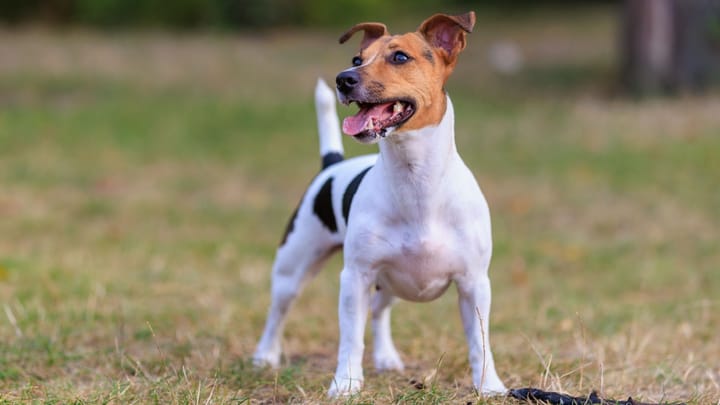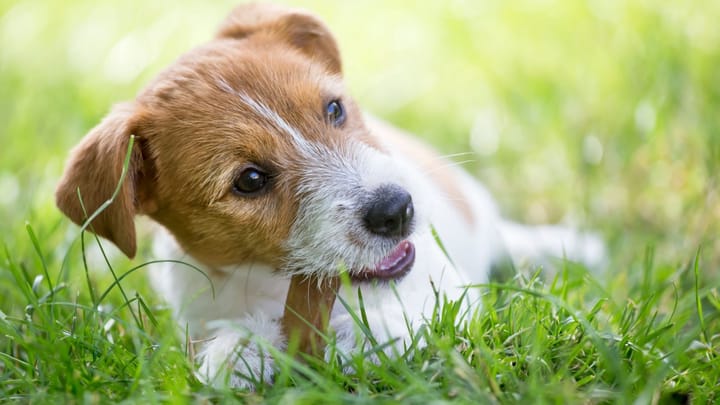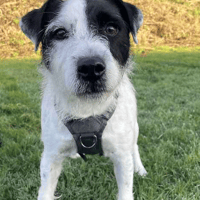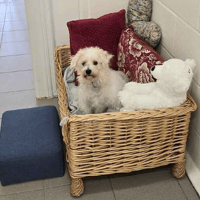Jack Russell Terrier
Other name: Jack Russell


The Jack Russell Terrier is a typical Terrier; lively, alert, active, fiery, and intelligent. They are bold and fearless, friendly, but confident. As a very playful and sociable dog, they are extremely energetic and often hyperactive, with a need for a lot of exercise. They enjoy long walks, though it is advised not to let them off the lead in a forest, unless you want to find them digging into a burrow!
|
Life expectancy |
The Jack Russell Terrier has a life expectancy of between 12 and 16 years |
|
Temperament |
|
|
Size |
Small
|
|
Adult size |
Female
Between 10 and 12 in
Male
Between 10 and 12 in
|
|
Adult weight |
Female
Between 11 and 13 lb
Male
Between 11 and 13 lb
|
|
Coat colour
Their coat is predominantly white with black and/or tan markings (ranging from light to dark fawn). |
White |
|
Type of coat
Their coat can be smooth, coarse or wiry. |
Very short Short Hard |
|
Eye colour
Their eyes are dark. |
Brown
|
Although robust, this dog is not immune to hereditary diseases which are sometimes the result of inbreeding. It is also important to pay attention when choosing your pet, as some Jack Russells are predisposed to hyperactivity and can be more difficult to handle.
More details about the Jack Russell Terrier
Jack Russell Terrier: Origins and history
The Jack Russell Terrier originates from England in the 19th century, where Reverend John (Jack) Russell selected a type of dog that could run like the Foxhound and go underground to hunt foxes and other game. He thus developed two breeds: one with longer legs, the Parson Jack Russell, and the other with shorter legs, the Jack Russell. The breed was only officially recognised in 2016.
Physical characteristics of the Jack Russell Terrier
The Jack Russell Terrier is a working Terrier that is robust, active and agile, with a strong personality. Their flexible body is of medium length, and longer than it is tall. Their eyes are small and almond-shaped, with a lively expression.
Jack Russell Terrier: Characteristics
Jack Russell Terrier: Behaviour
Training a Jack Russell Terrier
Like any good Terrier, this dog has a hell of a temperament. They are not easy to handle and both their docility and ability to concentrate can be very fragile. Nevertheless, as long as their trainer’s attitude is firm, clear and rules have been established early on, the Jack Russell will be obedient. The most important thing with this working dog is to acknowledge their working capacity. Being very dynamic, this small dog can have difficulties concentrating. In fact, the optimum training sessions should be short and always end positively. In addition, positive training, through play and reward, has proven to be very beneficial to this playful and greedy breed.
Jack Russell Terrier: Lifestyle
Breed compatibility Jack Russell Terrier
Jack Russell Terrier: Purchase price
The price of a Jack Russell Terrier varies according to their origins, age and sex. On average, the price of a pedigree dog is around £400, but can go up to £700. It will cost on average £18/month to meets the needs of a dog this size.
Jack Russell Terrier: Shedding
Heavy !
When moulting you will need to brush your dog daily.
Jack Russell Terrier: Grooming
As a simple dog, their short coat does not require any particular maintenance, except a few regular brushings to maintain the beauty and protective quality of it. It is necessary to inspect their skin after a walk, especially in the forest. Their eyes and ears should be cleaned regularly.
Jack Russell Terrier: Health
The estimated lifespan is 14 years.
Like many Terriers, the Jack Russell Terrier is a robust dog with a long life span.
They are not particularly sensitive to heat, but they should avoid working too hard when temperatures are high.
When active, the cold does not affect this reckless dog. No matter the weather, they are keen to go out and use up their excess energy. On the other hand, be careful not to leave them outside at night during the winter season.
The Jack Russell often becomes overweight due to being mistaken for a companion dog rather than a working dog. In fact, they rarely use up enough of their energy and the calories they consume are hardly burned.
- Lens dislocation
- Cataract
- Deafness
- Dislocation of the kneecap
- Ataxia (nervous system disorder)
- Myasthenia
- Legg-Perthes-Calvé disease
- Von Willebrand Disease














